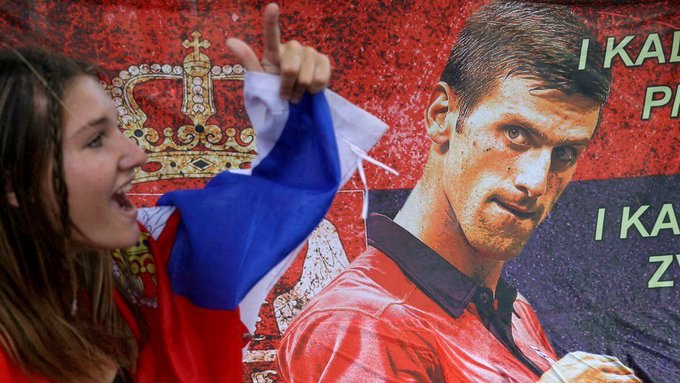A fine mess indeed
0The Novak Djokovic saga is dominating sports news cycles, as the tennis World No1 and 20-time Grand Slam champion sits in a Melbourne hotel waiting to find out if he’ll be able to go for a record-breaking 21st title. Or will he be the recipient of a swift return of Serb?
The simple version of events is this. Djokovic – who remains, somewhat notoriously, unvaccinated at this point in the Covid pandemic – was granted an exemption from the Australian Open’s mandate requirement to compete at Melbourne Park. However he was then denied entry to Australia by federal authorities, apparently due to the exemption he has claimed not being compatible with the entry visa he was granted.
But go a little further, and well, the whole thing gets rather murky. So let’s try and clear it up.
Back in November Tennis Australia and Open organisers announced a mandate to compete at Melbourne Park, a move widely applauded especially by those in a city and state that had endured one of the longest periods in some form of lockdown anywhere. It did also however turn the spotlight on Djokovic who was the only player in the sports upper echelons that hadn’t made their status public, and fuelled speculation he’d be forced to miss the event or change his stance. But TA also left the door open with an exemption process, under which Djokovic applied.
Now let’s be clear on one point: Djokovic wasn’t granted an exemption because he’s Novak Djokovic. Those applications were considered by two panels with all identifying information redacted, so the reviewers had no knowledge of just who it was they were looking at. It was only when Djokovic himself announced he’d been granted an exemption, that the furore kicked off.
Which then brings us to a second point to clarify. Djokovic’s exemption only got him into Victoria and to play in the Open. It didn’t also grant him entry to Australia, and from reports so far his claimed exemption wasn’t valid for the visa that he held.
But what was that exemption for? Again nothing has been confirmed but most reports believe that Djokovic’s application was based around having had Covid in the past six months, which was one of the criteria for application set out by Tennis Australia.
Here’s the kicker. Once the exemption process became known, Australian federal health and border authorities contacted TA boss Craig Tiley advising that having recently had Covid was not a valid reason for quarantine-free entry into the country. Yet it remained so for TA, to the extent that it may have been the advice given to Djokovic and others for their visa, such as Czech women’s double player Renata Voracova (who left Australia after being denied entry).
So when did Djokovic contract Covid? It’s believed he returned a positive test on December 16, after having attended and then mingled with players in a Red Star vs Barcelona EuroLeague basketball match in Belgrade where several players subsequently tested positive. If so it would be his second infection, having also tested positive in April 2020 in the early days of the pandemic and in the midst of a now-infamous series of exhibition events and parties that acted as a superspreader across the Balkans.
Makes sense right? It did until Patrick McEnroe tweeted out this.
So let me get this straight…
Novak tested positive on Dec 16, appeared at his own public event on Dec 18?….
And in order to apply for the medical exemption one had to submit documentation by Dec 10..?? pic.twitter.com/k5SIwqFWQB
— Patrick McEnroe (@PatrickMcEnroe) January 8, 2022
What’s the truth here? It seems hard to suggest McEnroe’s citation is incorrect, so did Djokovic submit his application late, or add to it afterwards, or is his reported December positive his THIRD (or more) Covid infection?
So, who’s at fault? It’s easy to point the finger at Djokovic. The goodwill he built up as “The Djoker” early in his career when he did bang-on on-court impersonations of Maria Sharapova and others has long since evaporated and, while some athletes are rather notorious for watching what they put into their bodies with WADA and other agencies looking over their shoulders, his attitude to the pandemic has been something else. You can start with the aforementioned events above, but even in the aftermath of his alleged recent infection he still attended an awards ceremony at his own eponymous academy for youngsters while unmasked the whole time. And without touching on his seemingly massive sense of entitlement, his refusal to get vaccinated has repeatedly drawn the ire of his colleagues, none the least his contemporaries Roger Federer and Rafael Nadal; as the latter has said this past week, if he’d been vaccinated this wouldn’t be an issue.
However, Tennis Australia and Craig Tiley deserve some, if not most of the blame. They created the situation – perhaps in fear of losing the defending champion and one of the major drawcards – where Djokovic could apply, and more so if they bent their own published rules to accommodate him prior to the review panel process. If they’d stuck to a total vaccinated-only mandate, then they might have incurred the wrath of the famously understanding Serbian people only (and as an aside, isn’t it great that Novak’s dad is living up to every tennis-parent stereotype ever created?). Instead, it seems that having created the mess they’ve now tried to walk away from it.
Who isn’t to blame? The Australian border authorities. Anyone who’s watched Border Security will know that they’re simply doing their job.
Djokovic’s appeal against his visa cancellation will be heard tomorrow at 10am Melbourne time (12 noon NZDT), and is open to the public via Microsoft Teams. That next piece in this saga could be worth tuning in for, but whichever way it goes seems very unlikely to be the end of it.
Follow Scott on Twitter

